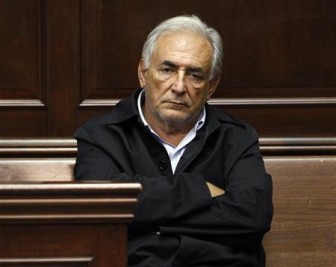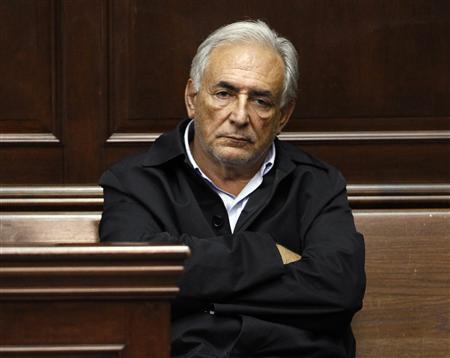NEW YORK (Reuters) – IMF chief Dominique Strauss-Kahn was denied bail today on attempted rape and other criminal charges, and prosecutors said they are investigating whether he may have engaged in similar conduct once before.
Defence lawyers, who sought unsuccessfully for Strauss-Kahn to be released on $1 million bail, denied the charges against their client, once seen as a strong contender for French presidential elections next year.
One of the defence attorneys, Ben Brafman, said it was “quite likely he will be exonerated.”
Strauss Kahn made his first appearance in court to face charges of trying to rape a Manhattan hotel maid in a case that has altered France’s political landscape and left the IMF in turmoil.
Prosecutors asked that Strauss-Kahn be remanded in custody due to concerns he might flee to France if released.
The judge set May 20 as the next date for the case.
A defence lawyer said Strauss-Kahn did not flee the hotel and the person he was having lunch with on Saturday, the day of the incident, will testify on his behalf.
Looking tired and grim-faced, Strauss-Kahn met with his lawyers in a back room of the Manhattan Criminal Court before he entered the courtroom. His hair was disheveled and he appeared to be wearing the same clothes he wore on Sunday.
Strauss-Kahn was not handcuffed when he was escorted to the booking station at the court.
His lawyers said he would plead not guilty to charges of a criminal sexual act, attempted rape and unlawful imprisonment that could bring a humiliating end to his public career and political ambitions.
“Our client willingly consented to a scientific and forensic examination …,” said William Taylor, the IMF chief’s Washington-based lawyer. “He’s tired but he’s fine.”
Any restriction the judge places on Strauss-Kahn’s freedom of movement after today’s arraignment hearing may determine whether he is able to continue in his globe-trotting role as managing director of the International Monetary Fund.
His arrest on Saturday plunged the Washington-based global lender into disarray in the midst of the euro zone’s debt crisis and threw France’s presidential race wide open. The IMF board postponed an informal meeting pending further information from New York.
German Chancellor Angela Merkel, whom Strauss-Kahn had been due to meet on Sunday, said that finding a successor for the Frenchman was “not a question for today,” but there were good grounds to have a European candidate ready.
European sources said French Economy Minister Christine Lagarde had been picking up support before the Strauss-Kahn news broke. Former Turkish Economy Minister Kemal Dervis is considered a favourite among the non-European possibilities.
More allegations involving Strauss-Kahn surfaced in Paris, where a lawyer said a woman writer was considering filing a legal complaint against the IMF chief over an alleged sexual incident dating back to 2002.
Strauss-Kahn, the Socialist early favourite in the 2012 presidential race, had his hands manacled behind his back and looked strained on Sunday as detectives led him to a waiting police sedan in front of a battery of television cameras.
A police spokesman said the 32-year-old chambermaid at the Times Square Sofitel had identified Strauss-Kahn on Sunday from a police lineup that included five other men.
Star lawyer
The IMF chief, who has retained Michael Jackson’s former star defence lawyer Benjamin Brafman to lead his legal team, submitted to the forensic examination with police looking for scratches or evidence of his alleged assault.
A charismatic figure, Strauss-Kahn led the IMF through the 2007-09 global financial meltdown, pressing for stimulus measures and interest rate cuts to avoid a depression, and has been central in galvanizing Europe to tackle its debt woes.
The IMF, which said Strauss-Kahn had been in New York on private business, moved to fill a leadership vacuum by naming No. 2 official, John Lipsky, as acting managing director.

Strauss-Kahn wore a black overcoat, blue dress shirt and black dress slacks on Sunday, his hair neatly parted, as he was escorted to a police car in front of the assembled media. He kept his eyes straight ahead, avoiding looking at the cameras.
French Socialist party leader Martine Aubry called the pictures, which dominated all news bulletins, “profoundly humiliating” and told reporters: “Fortunately in France we have a law on the presumption of innocence which means that at this stage of proceedings, people cannot be shown like this.”
Naked chase
Police said the maid had described how the IMF chief, naked, sprang on her from the bathroom of his hotel suite, chased her down a hall, pulled her into a bedroom and assaulted her.
She told police she broke free but that he dragged her into the bathroom where he forced himself on her again.
The woman, who has not been named, was treated in hospital for minor injuries. She has worked at the hotel for three years and the property’s manager said she has been a “completely satisfactory” employee in her work and her behaviour.
Strauss-Kahn’s wife, French television personality Anne Sinclair, jumped to her husband’s defence, saying she did not believe the accusations “for a single second,” and other supporters in France cautioned against a rush to judgment.
Police say Strauss-Kahn left his $3,000-a-day suite in such a rush that he left his mobile phone behind but a French tourist who said she saw him check out told France 2 television he had appeared calm and in no hurry.
After he called the hotel from John F. Kennedy airport asking about his phone, police located him in the first-class section of an Air France flight bound for Paris. He was pulled from the flight minutes before takeoff.
Police say the IMF chief does not have diplomatic immunity from the charges, which if proven could carry a prison sentence of 15 to 20 years.
Defence attorney Brafman is a high-profile criminal lawyer who was part of the team that successfully defended pop singer Michael Jackson against child molestation charges in 2005. Brafman also won an acquittal on weapons and bribery charges for rap mogul Sean “P. Diddy” Combs.
In France, Strauss-Kahn had not yet declared his candidacy but was widely expected to seek the Socialist Party nomination.
Early opinion polls gave him a big lead over conservative incumbent Nicolas Sarkozy, who is likely to seek a second term at the election next April.
France’s government as well as Strauss-Kahn’s allies and rivals called for caution and respect for the presumption of innocence. But unless the case against him collapses rapidly, it is hard to see how he could enter the Socialist primary, for which the deadline for candidates to declare is July 13.
That leaves former party leader Francois Hollande and 2007 presidential candidate Segolene Royal as the only declared Socialist contenders, but Aubry or former Prime Minister Laurent Fabius might join the race if Strauss-Kahn is out.
French voters are famously tolerant of political leaders’ extramarital affairs, but the allegations against Strauss-Kahn are entirely different, and much more serious.
The charges were a huge embarrassment for an institution that oversees the world economy and has authorized hundreds of billions of dollars of loans to troubled countries.
The IMF faces questions of its own, because Strauss-Kahn’s character had been questioned before. In 2008, he apologized for “an error of judgment” after an affair with a female IMF economist who was his subordinate.
The Fund’s board warned him against improper conduct, but cleared him of harassment and abuse of power and kept him in his job. It will now face new scrutiny over whether that response was too weak, especially as there have been persistent rumours about Strauss-Kahn making sexual advances to women.
The left-leaning French daily Liberation published comments it said he had made at a private lunch with reporters last month in which he said the three most difficult hurdles for his presidential bid would be “money, women and my Jewishness.”

